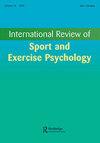Complex interventions
IF 6.7
2区 心理学
Q1 HOSPITALITY, LEISURE, SPORT & TOURISM
International Review of Sport and Exercise Psychology
Pub Date : 2022-01-18
DOI:10.1080/1750984X.2021.2001838
引用次数: 506
Abstract
ABSTRACT Methods of analysis in systematic reviews of interventions continue to develop as authors seek to answer questions about not only whether interventions work, but how and why they work. As our knowledge improves about how complexity in intervention design, implementation and context explains the variation in the association between interventions and outcomes, systematic reviewers increasingly seek to understand this complexity. This article explores how authors of systematic reviews can through their analysis provide the evidence that supports our understanding of how sport and exercise psychology interventions are intended to work and how complexity in the interventions themselves and in the environment they are introduced into may explain the variation in their impacts. It identifies key methods and tools to support reviewers to understand and analyse complexity in interventions, illustrated with examples from sport and exercise psychology. While complexity can be challenging to incorporate into an analysis of interventions in a systematic review, it is an important step for reviewers to take to make sense of large and complex bodies of evidence and to inform the efficient development and adaptation of interventions.复杂的干预措施
干预措施系统综述中的分析方法不断发展,因为作者不仅试图回答干预措施是否有效的问题,而且还试图回答干预措施如何有效以及为什么有效的问题。随着我们对干预措施设计、实施和背景的复杂性如何解释干预措施与结果之间关联的变化的认识的提高,系统审稿人越来越多地寻求理解这种复杂性。本文探讨了系统综述的作者如何通过他们的分析提供证据,支持我们理解运动和运动心理学干预是如何起作用的,以及干预本身和干预所处环境的复杂性如何解释其影响的变化。它确定了关键的方法和工具,以支持审稿人理解和分析干预措施的复杂性,并举例说明了体育和运动心理学。虽然在系统评价中将复杂性纳入对干预措施的分析可能具有挑战性,但对于审稿人来说,理解大量复杂的证据并为有效制定和适应干预措施提供信息是重要的一步。
本文章由计算机程序翻译,如有差异,请以英文原文为准。
求助全文
约1分钟内获得全文
求助全文
来源期刊
CiteScore
17.30
自引率
9.10%
发文量
33
期刊介绍:
International Review of Sport and Exercise Psychology is the first scholarly, peer-reviewed journal that publishes critical reviews of research literature in sport and exercise psychology. Typically, these reviews evaluate relevant conceptual and methodological issues in the field and provide a critique of the strengths and weaknesses of empirical studies that address common themes or hypotheses. The reviews present summaries of, and conclusions about, the current state of knowledge concerning topics of interest, as well as assessments of relevant unresolved issues and future trends. Reviews of research literature on theories, topics and issues that are at the interface with mainstream psychology are especially welcome.

 求助内容:
求助内容: 应助结果提醒方式:
应助结果提醒方式:


